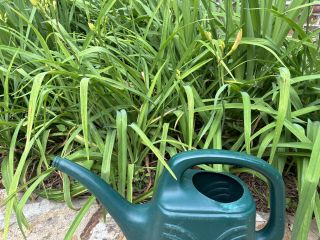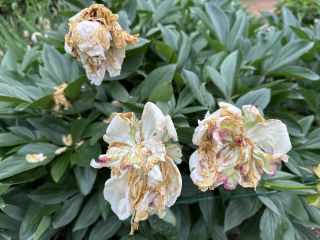Parenting
Parenting Is Like Gardening
Tips for family flourishing are presented using metaphors of gardening.
Posted May 17, 2024 Reviewed by Davia Sills
Key points
- The job of child rearing is challenging and complex, and a playful use of metaphors allows perspective.
- Boundaries, shaping, and tilling are skills that can be used in gardens and in families.
- Appreciating imperfection and accepting individuality is an important part of loving acceptance.
Parenting is such an incredibly important job yet often so elusive in the ever-changing, individualized responsibilities. There is virtually no training, no qualification test to pass, and no pay, yet we all want to do the best job we can in raising our children. Using gardening as a metaphor, several ideas for positive family flourishing are presented for consideration.

Provide the basics
Plants need food, sun, and a place to grow. Similarly, children thrive best when they are eating properly, sleeping adequately, and feeling safe in their homes. They need to know they are loved and cared about with face-to-face human connection.
Humans are biologically wired to thrive in connected relationships, being necessary for the survival of our species. Attending to such basics will support children to bloom into healthy, solid adults.
Make a plan
Just as knowing one’s temperate zones assists in knowing which seeds might grow best, knowing our own strengths, weaknesses, and goals assists in parenting preparation. Examining one’s own experiences from childhood and considering the parts that deserve to be passed on to the new generation can be thoughtfully supported. Consider what you liked and didn’t like about your childhood, and then determine which mindsets you would like to keep and which you would like to discard.

Appreciate individuality
Seeing the many shapes, sizes, and colors of a mature garden provides a renewed realization that the variation adds to the beauty of a garden. Equally, our children (not to mention spouses, co-workers, and friends) come into our lives with different strengths and weaknesses.
The seeds planted may look the same to start, but each seedling has a unique blueprint of growth already established within its nucleus. A sensitive orchid needs a different kind of care than a hardy lantana, but each brings forth beautiful features. Embrace the variety, look for the unexpected, and seek out the spark of beauty in each child.
Accept imperfection
Imperfection is a given in any garden, with weeds that get through or seedlings that don’t sprout as expected—despite vigilant efforts and tending lovingly to growth. It’s not necessary to take this personally or obsess with hindsight and regret. Notice the things that are going well and choose to accept with kindness the variance in our families. Although there are behaviors and habits that might need direct intervention (e.g., aggression), there are also others that might be better served with acceptance (e.g., morning grumpiness or slow-to-transition tendencies). Gardens—and life—are not flawless, and so picking our battles is important.

Create boundaries
Just as knowing where the garden begins and ends is necessary in terms of measuring mulch, clear boundaries for children are critical for their lives as well. Having some level of clarity, consistency, and organization in daily life provides structure, meaning, and purpose. Set up routines for daily activities, such as homework, bedtime, and meals, as well as communication, reward routines, and plans for managing difficult behavior. Such margins can provide security and ultimately help children be more skilled at setting limits in their future relationships and work.
Engage in shaping
Bushes and branches may need periodic shaping as they grow a bit askew or unbalanced. Children, too, can often be coached into more positive positions. Instead of long lectures, try brief, targeted statements. Be straightforward and say what you mean in a calm, neutral tone of voice. Move away from asking negative, rhetorical questions (e.g., “Why do you always do that?”) to more specific, constructive statements (e.g., “Please hang your jacket up when you come into the house”). Catch your child engaging in positive behaviors and use encouraging words to help them build stand-tall pride.

Seek out solutions
Just as having an infestation of beetles is certainly not ideal, it also does not require panic or upheaval of everything in the garden. Thoughtfully stepping back to find reasonable solutions will have much longer-term success than any alarm reactions.
And because children are much more likely to implement a solution if they have been a part of its development, engaging them in problem-solving can be key. Using empathetic listening allows us to encourage them to solve issues (e.g., “How do you want to handle that?”) rather than if advice is angrily delivered (“You should have just done—!”). Facing adversity with support develops traits of resilience, as hardship is often where the real growth happens.
Provide supports
Just as a vulnerable sapling or tomato plant might be given the support of a wire structure to hold it upright, parents can also sometimes themselves benefit from outside supports that assist in a child growing strong. Having the wisdom to know when a family could benefit from additional support is essential, whether through a tutor, therapist, support group, or wise mentor. There is no shame in having problems, and there is strength in seeking out the resources to assist in managing them.

Till the soil
Tilling the soil in a garden helps spread nutrients around and reenergizes the soil. Similarly, there is evidence that changing up one’s environment every once in a while is valuable as well. While we humans like routines and structure, renewing our environment by adding in a new type of dinner, introducing a different family activity, or trying out a new vacation destination invigorates us with energy. Spruce things up with a bit of alteration and spice things up with a new flash of color. Although change can be hard, it has value as well.
Raising children can be full of challenges, worries, and turbulent times, but it can also be a wonderful growth experience for all. Part of our job as parents is to work ourselves out of a job, with the hope that our children will be eventually transplanted to their own gardens of life; however, they will carry with them the experiences and the memories of the care provided during their time with their parents. Tending mindfully to the family garden supports individualized, positive development—for our children and ourselves.




